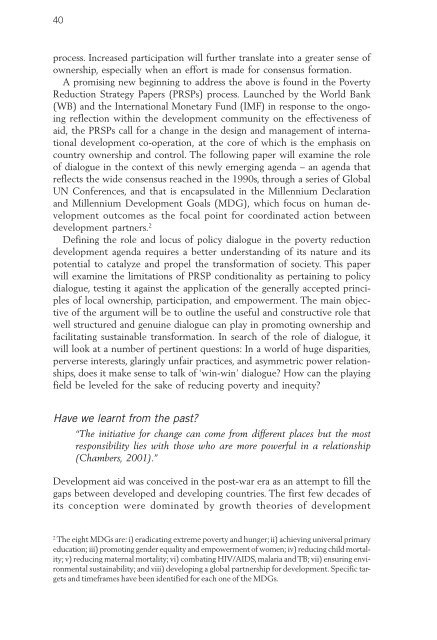Dialogue in Pursuit of Development - Are you looking for one of ...
Dialogue in Pursuit of Development - Are you looking for one of ...
Dialogue in Pursuit of Development - Are you looking for one of ...
Create successful ePaper yourself
Turn your PDF publications into a flip-book with our unique Google optimized e-Paper software.
40<br />
process. Increased participation will further translate <strong>in</strong>to a greater sense <strong>of</strong><br />
ownership, especially when an ef<strong>for</strong>t is made <strong>for</strong> consensus <strong>for</strong>mation.<br />
A promis<strong>in</strong>g new beg<strong>in</strong>n<strong>in</strong>g to address the above is found <strong>in</strong> the Poverty<br />
Reduction Strategy Papers (PRSPs) process. Launched by the World Bank<br />
(WB) and the International M<strong>one</strong>tary Fund (IMF) <strong>in</strong> response to the ongo<strong>in</strong>g<br />
reflection with<strong>in</strong> the development community on the effectiveness <strong>of</strong><br />
aid, the PRSPs call <strong>for</strong> a change <strong>in</strong> the design and management <strong>of</strong> <strong>in</strong>ternational<br />
development co-operation, at the core <strong>of</strong> which is the emphasis on<br />
country ownership and control. The follow<strong>in</strong>g paper will exam<strong>in</strong>e the role<br />
<strong>of</strong> dialogue <strong>in</strong> the context <strong>of</strong> this newly emerg<strong>in</strong>g agenda – an agenda that<br />
reflects the wide consensus reached <strong>in</strong> the 1990s, through a series <strong>of</strong> Global<br />
UN Conferences, and that is encapsulated <strong>in</strong> the Millennium Declaration<br />
and Millennium <strong>Development</strong> Goals (MDG), which focus on human development<br />
outcomes as the focal po<strong>in</strong>t <strong>for</strong> coord<strong>in</strong>ated action between<br />
development partners. 2<br />
Def<strong>in</strong><strong>in</strong>g the role and locus <strong>of</strong> policy dialogue <strong>in</strong> the poverty reduction<br />
development agenda requires a better understand<strong>in</strong>g <strong>of</strong> its nature and its<br />
potential to catalyze and propel the trans<strong>for</strong>mation <strong>of</strong> society. This paper<br />
will exam<strong>in</strong>e the limitations <strong>of</strong> PRSP conditionality as perta<strong>in</strong><strong>in</strong>g to policy<br />
dialogue, test<strong>in</strong>g it aga<strong>in</strong>st the application <strong>of</strong> the generally accepted pr<strong>in</strong>ciples<br />
<strong>of</strong> local ownership, participation, and empowerment. The ma<strong>in</strong> objective<br />
<strong>of</strong> the argument will be to outl<strong>in</strong>e the useful and constructive role that<br />
well structured and genu<strong>in</strong>e dialogue can play <strong>in</strong> promot<strong>in</strong>g ownership and<br />
facilitat<strong>in</strong>g susta<strong>in</strong>able trans<strong>for</strong>mation. In search <strong>of</strong> the role <strong>of</strong> dialogue, it<br />
will look at a number <strong>of</strong> pert<strong>in</strong>ent questions: In a world <strong>of</strong> huge disparities,<br />
perverse <strong>in</strong>terests, glar<strong>in</strong>gly unfair practices, and asymmetric power relationships,<br />
does it make sense to talk <strong>of</strong> ‘w<strong>in</strong>-w<strong>in</strong>’ dialogue? How can the play<strong>in</strong>g<br />
field be leveled <strong>for</strong> the sake <strong>of</strong> reduc<strong>in</strong>g poverty and <strong>in</strong>equity?<br />
Have we learnt from the past?<br />
“The <strong>in</strong>itiative <strong>for</strong> change can come from different places but the most<br />
responsibility lies with those who are more powerful <strong>in</strong> a relationship<br />
(Chambers, 2001).”<br />
<strong>Development</strong> aid was conceived <strong>in</strong> the post-war era as an attempt to fill the<br />
gaps between developed and develop<strong>in</strong>g countries. The first few decades <strong>of</strong><br />
its conception were dom<strong>in</strong>ated by growth theories <strong>of</strong> development<br />
2 The eight MDGs are: i) eradicat<strong>in</strong>g extreme poverty and hunger; ii) achiev<strong>in</strong>g universal primary<br />
education; iii) promot<strong>in</strong>g gender equality and empowerment <strong>of</strong> women; iv) reduc<strong>in</strong>g child mortality;<br />
v) reduc<strong>in</strong>g maternal mortality; vi) combat<strong>in</strong>g HIV/AIDS, malaria and TB; vii) ensur<strong>in</strong>g environmental<br />
susta<strong>in</strong>ability; and viii) develop<strong>in</strong>g a global partnership <strong>for</strong> development. Specific targets<br />
and timeframes have been identified <strong>for</strong> each <strong>one</strong> <strong>of</strong> the MDGs.

















![CynefinFramework final [Read-Only]](https://img.yumpu.com/19017304/1/190x135/cynefinframework-final-read-only.jpg?quality=85)